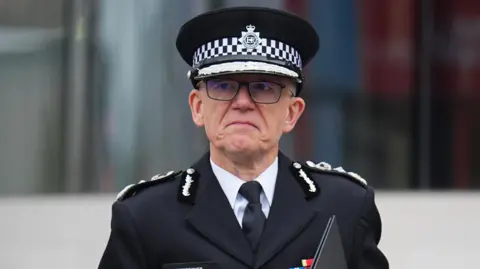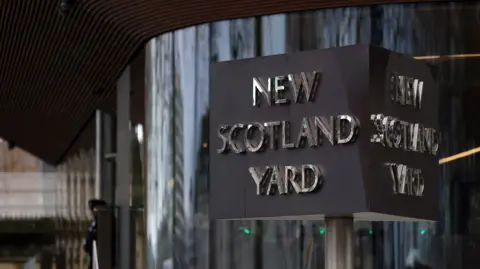Met officers who fail vetting scheme may keep jobs
 PA Media
PA MediaPolicing has been left in a "hopeless position", Met Commissioner Sir Mark Rowley said, after the High Court ruled the force could not dismiss officers by removing their vetting clearance.
The ruling came after Sgt Lino Di Maria mounted a legal challenge after having his vetting removed following sexual assault allegations, which he denied and was not charged over.
Sir Mark said the force now did not have any mechanism to get rid of officers who were not fit to keep their vetted status, including officers who "cannot be trusted to work with women" or "enter the homes of vulnerable people".
However, Mrs Justice Lang said the dismissal process which had been used by the Met was unlawful as those suspected of wrongdoing were denied an opportunity to defend themselves.
The ruling has huge implications for the ability of police chiefs to sack officers and is a major blow to Sir Mark's pledge to root out people who he says should not be in the force.
He said the Met would appeal against the decision.
The Metropolitan Police Federation, which represents officers, backed Sgt Di Maria's judicial review and welcomed the ruling, saying it was about "ensuring a fair, but more importantly, legal process was in place".
"The Metropolitan Police must recognise the law and - it goes without saying - operate within it. That's what today's ruling clearly emphasises," it said in a statement.
The court ruling comes after an independent report into the murder of Sarah Everard by police officer Wayne Couzens in March 2021 called for police vetting procedures to be overhauled.
Met Police vetting is a background check on both new applicants and current officers - which can include checks on criminal records, finances, and close associates - to identify unsuitable individuals.
Sgt Di Maria was found to have no case to answer in respect of misconduct allegations and argued that having his vetting removed without the accusations being proven was a breach of his right to a fair trial.
Sir Mark said officers such as Sgt Di Maria would remain on vetting special leave, and described the position as a "ridiculous waste of money" but the "least bad option".
Speaking to reporters outside Scotland Yard, Sir Mark said: "We now have no mechanism to rid the Met of officers who were not fit to hold vetting - those who cannot be trusted to work with women, or those who cannot be trusted to enter the homes of vulnerable people.
"It is absolutely absurd that we cannot lawfully sack them.
"This would not be the case in other sectors where staff have nothing like the powers comparable to police officers."
'Dangerous officers'
In her ruling, Mrs Justice Lang said the Met's powers did not "extend to the dismissal of a police officer by reason of withdrawal of vetting clearance".
Her judgement stated that dismissal should be provided for in regulations from the Home Secretary, which they are currently not.
Mrs Justice Lang added: "This results in an anomalous situation where officers who do not have basic vetting clearance cannot be dismissed."
She ruled that part of the problem was that the previous Conservative government had not decided on potentially more effective rules before the election was called.
The new Labour government announced last October it would introduce rules to dismiss officers who could not hold vetting – and the formal consultation on its proposals is closing this week.
Following the ruling, a Home Office spokesperson said it was "acting rapidly" to ensure police forces could "dismiss officers who cannot maintain vetting clearance".
London's Independent Victims' Commissioner Claire Waxman said the decision was a "significant blow" to the hard work of the Met to "root out dangerous officers and restore public trust and confidence, and the consequences should concern us all".
Domestic abuse charity Refuge urged the government to act urgently and amend the regulations to close the "loophole".
 EPA-EFE/REX/Shutterstock
EPA-EFE/REX/ShutterstockMayor of London Sir Sadiq Khan said he was disappointed by the judgement and was pleased the Met was appealing against it.
"Since I've been mayor, I've been quite clear about the importance of London getting the police service we deserve," he added.
Sgt Di Maria, who headed a forensic services team, lost his vetting clearance in September 2023.
His appeal was rejected, a decision that paved the way for him to be sacked for gross incompetence, on the basis that he could no longer perform his duties.
In August 2019, a serving police officer alleged that Sgt Di Maria had raped her in a car parked at a Tesco, on two separate occasions after visiting a gym.
The sergeant denied the claims, saying both incidents had been consensual sex.
Met chiefs then placed him on restricted duties – but in June 2021, the Crown Prosecution Service concluded the officer should not be charged, saying there were inconsistencies in the female officer's account.
The court said that other unproven allegations had been made against Sgt Di Maria, including that he had sent inappropriate emails to the wife of a colleague, a further historical allegation of rape, and inappropriate behaviour around female colleagues.
Those allegations led bosses to reconsider the sergeant's vetting and remove it, paving the way for further disciplinary action and dismissal.
In the wake of public outrage over Wayne Couzens and David Carrick, who committed violent sexual crimes while serving as Met officers, the force launched Operation Assure as the process for reviewing and revoking vetting clearance of officers and staff deemed unfit to serve.
In the last 18 months:
- 96 officers have been sacked or resigned due to vetting removal
- 29 are on special vetting leave, having lost vetting
- More than 100 are in the early stages of vetting reviews
- 82 have had their vetting retained, which the force says shows the process is "fair and proportionate"
- Seven have successfully appealed
It also launched Operation Onyx which looked at every completed sexual offence or domestic abuse case involving a police officer or staff member between April 2012 and April 2022, where the allegation did not lead to them being sacked.
The force has more than 33,000 police officers and about 11,000 civilian staff.
A Met spokesperson said: "Those we have removed vetting from, had a pattern of behaviour that meant if they applied to work in policing today, we'd never let them in."
Listen to the best of BBC Radio London on Sounds and follow BBC London on Facebook, X and Instagram. Send your story ideas to [email protected]
